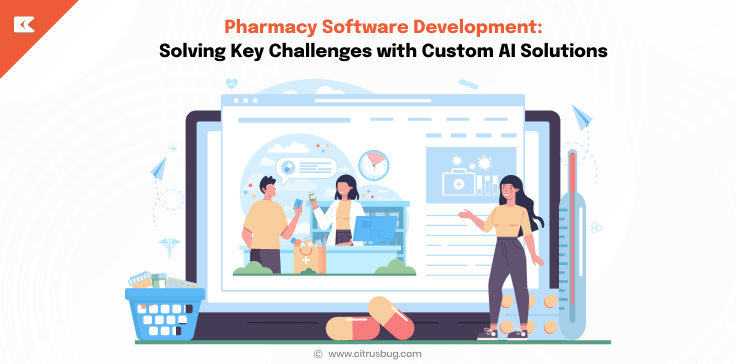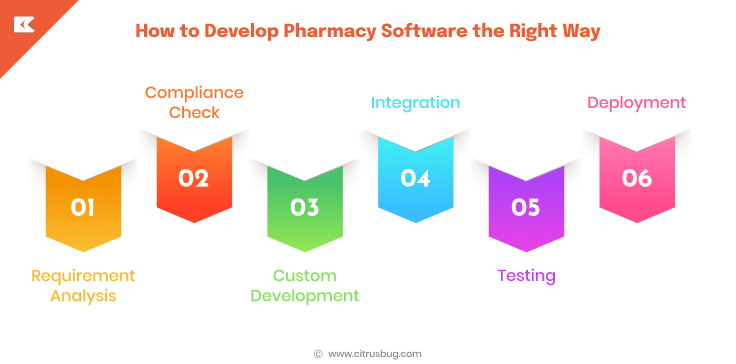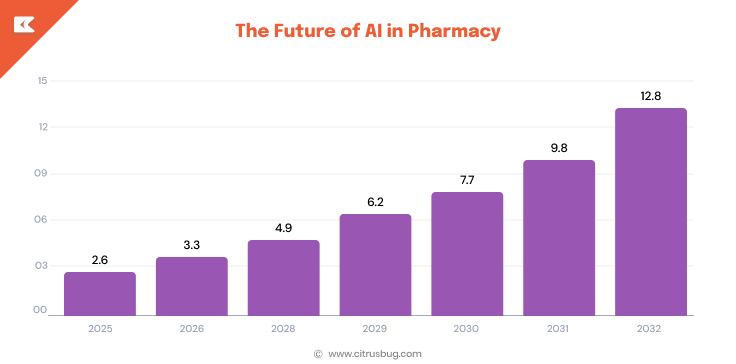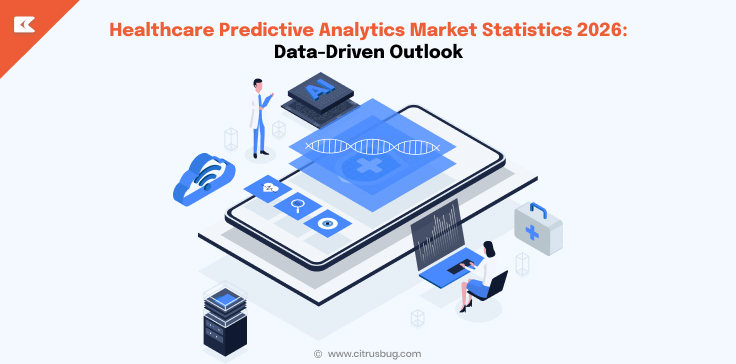Pharmacy Software Development: Solving Key Challenges with Custom AI Solutions
- September 25, 2025
-
763 Views
- by Ishan Vyas
Table of Contents
- What is Pharmacy Software and Why Do Pharmacies Need It?
- Key Challenges in Modern Pharmacy Operations
- How to Develop Pharmacy Software the Right Way
- Laws and Regulations to Consider During Pharmacy Software Development
- Role of Technology and AI in Pharmacy Software
- Which Software is Best for a Pharmacy?
- The Future of AI in Pharmacy
- Conclusion
- FAQs

Pharmacy software development is transforming the way pharmacies work in this increasingly complex healthcare environment. There are multiple factors, such as inventory management, expired medications and prescription errors that directly impact patient safety. At the same time, pharmacies also have to meet strict healthcare regulations and maintain smooth operations.
Traditional software and manual processes cannot keep up with these advanced, ever-changing AI healthcare trends. AI-driven customized pharmacy management software provides accurate inventory forecasting, automated prescription verification, and better patient engagement. This helps pharmacists reduce errors, saving time on manual tasks and focusing on delivering better care.
This blog discusses issues that pharmacies struggle with, how AI custom solutions help solve them, and how technology will evolve in pharmacy management.
What is Pharmacy Software and Why Do Pharmacies Need It?
Pharmacy software refers to digital systems that manage day-to-day pharmacy operations. It includes inventory management, prescription orders, billing, and adherence to healthcare requirements. The contemporary pharmacy software can be incorporated with the hospital system, electronic health records (EHRs), and insurance providers to facilitate workflow.
The following are some of the most significant reasons why pharmacies require software:
- Reduce Errors: Automates prescriptions and inventory control to avoid mistakes.
- Save Time: Automates the daily operations such as billing, stock records and reporting.
- Ensure Compliance: Helps to address the healthcare regulations and maintain proper records of the patients.
- Improve Inventory Management: Monitors inventory on a real-time basis and predicts demand to prevent shortages or overstock.
- Improve Patient Care: Promotes personal communication with patients and drug refills.
- Integrate Systems: Connects seamlessly with EHRs, labs, and insurance companies to minimize manual processes.
Pharmacy software also improves with the help of AI features. Predictive analytics has the potential to predict what inventory will be required, identify possible prescription mistakes, and enhance the overall efficiency of operations. Pharmacies can invest in developing tailored software to suit their special needs.
Key Challenges in Modern Pharmacy Operations
Pharmacies experience several issues that influence productivity, patient safety, and performance. The awareness of such problems shows the importance of pharmacy software development.
Stock Management Issues
Pharmacies are faced with the problem of overstocking or shortages that translate to wastage of drugs and loss of money. Manual tracking complicates the process of predicting demand and creates the risk of stock expiry.
Prescription Errors & Compliance Risks
Mistakes in dosage, interactions, or labeling can threaten patient safety and violate regulations. Manual checks are time-consuming and do not always detect errors.
Poor Integration with EHRs/Insurance
Disconnected systems prevent seamless data flow, causing duplicate work and operational delays. Lack of integration increases errors in patient records and billing processes.
Manual Workflows & Time Loss
Pharmacists are spending too much time on billing, reporting and documentation rather than attending to patients. Repetitive tasks reduce efficiency and increase staff workload unnecessarily.
Data Security Concerns
Without compliant, secure, and encrypted systems, sensitive patient data and prescription data are at risk. Information breaches may lead to penalties, lawsuits, and negative publicity.
Weak Patient Engagement
Conventional systems do not provide much assistance in terms of refill notifications, customized communication, or drug compliance. Ineffective interactions can reduce dedication to treatment and patient satisfaction.
AI-powered pharmacy software addresses these challenges by automating tasks, ensuring compliance, predicting inventory needs, and enhancing patient care.
How to Develop Pharmacy Software the Right Way
The design of an efficient pharmacy software should have a systematic way of addressing the requirements of operations, regulation and patient care. It is a step-by-step procedure as follows:
-
Requirement Analysis
Determine pharmacy processes, operational bottlenecks and objectives. Ensure that all real-world needs are well taken care of by getting input from pharmacists, staff, and administrators.
-
Compliance Check
Review HIPAA, FDA, and local pharmacy regulations thoroughly. Make sure that the software design has all the required precautions to ensure compliance with the law and the safeguarding of patient information.
-
Custom Development
Develop software that suits the needs of the pharmacy. Include inventory management, prescription checks, reporting features and friendly interfaces to staff.
-
Integration
Connect the new system with EHRs, lab systems, insurance platforms, and other healthcare IT. Make sure that the flow of data is smooth and does not cause any errors or duplication of work.
-
Testing
Conduct functional, performance, and security testing under realistic scenarios. Identify and fix errors, bottlenecks, or vulnerabilities before full deployment to guarantee reliability.
-
Deployment
Implement the software with proper training for pharmacists and staff. Monitor early performance, gather user feedback, and make iterative improvements for maximum efficiency.
The use of this systematic process is guaranteed to help pharmacy software focus on operational issues, facilitate compliance, and enhance efficiency in the workflow. Inventory prediction, prescription checks, and general workflow insights are also additional areas that can be improved with the help of AI.
Laws and Regulations to Consider During Pharmacy Software Development
Pharmacy software development must follow the healthcare regulations strictly. Compliance ensures the security of patient data, eliminates legal implications and preserves trust. These important rules to note are:
1. HIPAA Compliance: The Health Insurance Portability and Accountability Act establishes the standards in terms of sensitive health information about patients. The software should ensure data security by encryption, access control and creating audit trails to avoid unauthorized access.
2. FDA and IEC 62304 Guidelines: These are the guidelines that are used to regulate the safety and lifetime maintenance of medical and healthcare software. After them, the software is guaranteed to have quality and reliability to use in clinical applications.
3. Local Pharmacy Laws: Depending on the location, these regulations control drug dispensing, record-keeping, and reporting. Software must be capable of complying with local laws to prevent lawsuits and help maintain the integrity of operations.
4. Data Privacy Regulations (e.g., GDPR): When pharmacies work with the data of patients in the EU or in any other country, the software must comply with the global regulations on data privacy, including consent management and data security.
5. Audit and Reporting Requirements: Pharmacy software must contain detailed logs and reporting options to facilitate inspections, internal audit, and reporting to the regulators. This ensures transparency and accountability in day-to-day activities.
It is important to follow these laws and regulations when developing pharmacy software. It not only protects patients but also makes sure that the software is reliable, safe and appropriate to the actual pharmacy practices.
Role of Technology and AI in Pharmacy Software
AI-Powered Prescription Scanning and Error Detection
AI systems review prescriptions for dosage errors, drug interactions, and potential conflicts. This reduces human mistakes and enhances patient safety significantly.
Predictive Analytics for Demand Forecasting
By analyzing historical sales and prescription data, AI predicts medication demand accurately. Pharmacies can maintain optimal inventory, avoid stock-outs and reduce waste.
AI Chatbots for Patient Queries and Reminders
Automated healthcare chatbots handle patient questions, provide refill reminders, and offer medication guidance. This enhances compliance and minimizes employee workload.
Impact of AI in Pharmacy
Integrating AI in pharmacy software optimizes operations, enhances patient care, and supports informed decision-making. AI has become an essential part of contemporary pharmacy solutions.
Which Software is Best for a Pharmacy?
The selection of suitable pharmacy management software is the key to effective pharmacy work. Pharmacies require AI development services that can ease workflows, mistakes, and patient care. The selection depends on the size of the pharmacy, the complexity of work, and individual needs.
Custom Pharmacy Software is developed to suit the individual requirements of pharmacies. It is flexible, scalable and integrates well with the existing systems. The complex workflows and compliance requirements can be managed better using custom solutions than using standard products.
AI-powered Software automates the validation of prescriptions, forecasts inventory demand, and helps communicate with patients. AI minimizes mistakes, conserves time, and offers effective insights that can be applied in making decisions.
Cloud-based Solutions provide pharmacies with access to data in real-time, remote management functionality, and automatic updates. They assist in ensuring smooth operations in various locations.
Integrated Healthcare Software links pharmacies to EHRs, labs and insurance companies. This guarantees proper billing, smooth data transfer and reduced manual errors.
Off-the-shelf Software can be applicable in small pharmacies that have standard requirements, but are usually not customized and feature-rich.
Key Considerations:
- Workflow complexity
- Compliance and reporting requirements
- System integration needs
- Scalability and future growth
Custom healthcare solutions are increasingly preferred for modern pharmacy operations. They combine efficiency, accuracy, and improved patient care in a long-term, sustainable solution.
The Future of AI in Pharmacy
Artificial Intelligence (AI) is poised to revolutionize pharmacy practice, enhancing efficiency, accuracy, and patient care. As we look toward 2025 and beyond, several key developments are shaping the future of AI in pharmacy:
1. Market Growth and Investment
The global AI in the pharmaceutical market is experiencing rapid expansion. Valued at approximately USD 1.73 billion in 2024, it is projected to reach USD 13.46 billion by 2032, growing at a compound annual growth rate (CAGR) of 29.33%. This boom is being pushed by the need to have more rapid drug discovery, precision medicine, and effective clinical trials.
2. Widespread Adoption in Drug Development
AI is becoming integral to drug development processes. According to a 2024 survey, 81% of organizations are utilizing AI in at least one development program. This widespread adoption underscores AI’s role in enhancing research and development efficiency.
3. Enhanced Clinical Decision Support
AI-powered clinical decision support tools are aiding pharmacists in analyzing large volumes of patient data to identify drug interactions, suggest therapy alternatives, and flag potential safety concerns. These tools are improving patient outcomes by facilitating more informed decision-making.
4. Increased Patient Engagement
The use of AI triage systems has resulted in a 40 percent rise in the number of people utilizing pharmacy services, with the level of patient satisfaction increasing by 35 percent through the reduction of waiting time and improved service quality. This means that AI has the capability of improving patient engagement and satisfaction.
5. Ethical and Responsible Integration
To address the need for the ethical factor, the International Pharmaceutical Federation (FIP) has already published its AI Plan 2025, which contains a global roadmap of responsible AI use in pharmacy. This strategy highlights the necessity of ethical incorporation so that AI technologies can add value to patients and health care systems.
Conclusion
Pharmacy software development, particularly with the addition of AI, is changing how pharmacies run. From improving inventory management and reducing prescription errors to streamlining workflows and enhancing patient engagement, technology plays a critical role in modern pharmacy operations. Being aware of the critical issues and applying specific solutions helps to make pharmacy activities safer, more efficient, and in line with regulations.
At Citrusbug, we specialize in custom pharmacy management software development. Our solutions assist pharmacies in optimizing their operations by integrating with the existing systems and providing improved patient outcomes. Through artificial intelligence and enhanced technology, pharmacies can ensure they remain at the forefront in a competitive and more regulated healthcare sector.
FAQs
How to develop pharmacy software?
Pharmacy software is designed by defining pharmacy needs, maintaining regulatory compliance such as HIPAA, and creating custom AI-driven services on inventory, prescriptions, and patient care.
What are the examples of pharmacy automation?
Robotic dispensing systems, inventory tracking using AI, automated billing, e-prescription scanning, and digital refill reminders are some of the examples that make pharmacy operations more streamlined.
Is AI used in pharmacy?
Yes. AI is used to validate prescriptions, forecast their demand, detect fraud, patient engagement chatbots, and pharmacy workflow automation to enhance efficiency and accuracy.
Which software is best for a pharmacy?
Custom pharmacy software is the most effective choice. It can be tailored to a pharmacy’s workflows, compliance requirements, and patient care needs, while integrating AI for inventory management, prescription validation, and automated communication.
What is the role of technology in pharmacy?
Technology streamlines workflows, reduces errors, enhances patient engagement, and supports compliance. AI and automation help with prescription validation, inventory management, and patient communication.





 SaaS Development
SaaS Development Web Application Development
Web Application Development Mobile Application Development
Mobile Application Development Custom Software Development
Custom Software Development Cloud Development
Cloud Development DevOps Development
DevOps Development MVP Development
MVP Development Digital Product Development
Digital Product Development Hire Chatbot Developers
Hire Chatbot Developers Hire Python Developers
Hire Python Developers Hire Django Developers
Hire Django Developers Hire ReactJS Developers
Hire ReactJS Developers Hire AngularJS Developers
Hire AngularJS Developers Hire VueJS Developers
Hire VueJS Developers Hire Full Stack Developers
Hire Full Stack Developers Hire Back End Developers
Hire Back End Developers Hire Front End Developers
Hire Front End Developers AI Healthcare Software Development & Consulting
AI Healthcare Software Development & Consulting Healthcare App Development
Healthcare App Development EHR Software Development
EHR Software Development Healthcare AI Chatbot Development
Healthcare AI Chatbot Development Telemedicine App Development Company
Telemedicine App Development Company Medical Billing Software Development
Medical Billing Software Development Fitness App Development
Fitness App Development RPM Software Development
RPM Software Development Medicine Delivery App Development
Medicine Delivery App Development Medical Device Software Development
Medical Device Software Development Patient Engagement Software Solutions
Patient Engagement Software Solutions Mental Health App Development
Mental Health App Development Healthcare IT Consulting
Healthcare IT Consulting Healthcare CRM Software Development
Healthcare CRM Software Development Healthcare IT Managed Services
Healthcare IT Managed Services Healthcare Software Testing services
Healthcare Software Testing services Medical Practice Management Software
Medical Practice Management Software Outsourcing Healthcare IT Services
Outsourcing Healthcare IT Services IoT Solutions for Healthcare
IoT Solutions for Healthcare Medical Image Analysis Software Development Services
Medical Image Analysis Software Development Services Lending Software Development Services
Lending Software Development Services Payment Gateway Software Development
Payment Gateway Software Development Accounting Software Development
Accounting Software Development AI-Driven Banking App Development
AI-Driven Banking App Development Insurance Software Development
Insurance Software Development Finance Software Development
Finance Software Development Loan Management Software Development
Loan Management Software Development Decentralized Finance Development Services
Decentralized Finance Development Services eWallet App Development
eWallet App Development Payment App Development
Payment App Development Money Transfer App Development
Money Transfer App Development Mortgage Software Development
Mortgage Software Development Insurance Fraud Detection Software Development
Insurance Fraud Detection Software Development Wealth Management Software Development
Wealth Management Software Development Cryptocurrency Exchange Platform Development
Cryptocurrency Exchange Platform Development Neobank App Development
Neobank App Development Stock Trading App Development
Stock Trading App Development AML software Development
AML software Development Web3 Wallet Development
Web3 Wallet Development Robo-Advisor App Development
Robo-Advisor App Development Supply Chain Management Software Development
Supply Chain Management Software Development Fleet Management Software Development
Fleet Management Software Development Warehouse Management Software Development
Warehouse Management Software Development LMS Development
LMS Development Education App Development
Education App Development Inventory Management Software Development
Inventory Management Software Development Property Management Software Development
Property Management Software Development Real Estate CRM Software Development
Real Estate CRM Software Development Real Estate Document Management Software
Real Estate Document Management Software Construction App Development
Construction App Development Construction ERP Software Development
Construction ERP Software Development








